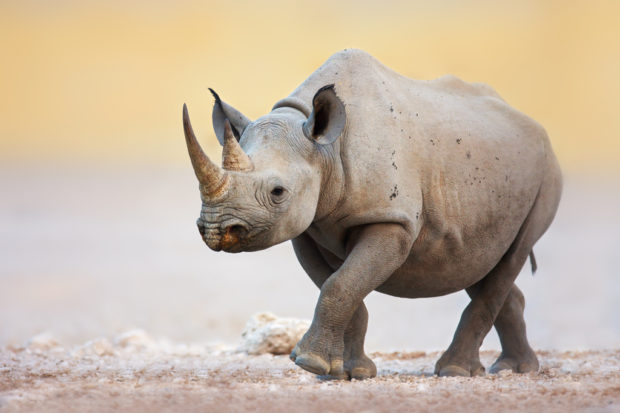
With a growing number of nations legislating against the import of threatened wildlife species body parts in recent years, the trophy hunting industry has turned its attention to places like China where they see an emerging market. Photo by iStock.com
In 2016, China made a historic decision to ban the trade in ivory and other elephant body parts, claiming a spot on the frontlines of the global war to end the trafficking of threatened species. But China is still the world’s second largest importer (after the United States) of hunting trophies from rhinos, who are also threatened with extinction. Demand for rhino horn, a market artificially boosted by wildlife businesses seeking to profit from such imports, has not abated over the years. For China to establish itself as a leader in the fight to halt the trade in body parts of threatened species, it is crucial that the nation end all rhino imports to its shores.
Chinese advocates have been fighting for exactly this outcome and their efforts have gained steam in light of new evidence showing that the global trophy hunting industry is now actively trying to expand its clientele in China. Yesterday, on World Rhino Day, leading Chinese animal protection and conservation organizations held a press conference and released a joint letter, co-signed by 35 groups across China, urging President Xi Jinping and China’s National Forestry and Grassland Administration to prohibit the import of rhino hunting trophies to China.
“Trophy hunting is deeply rooted in Western colonialism and incompatible with Chinese history and tradition,” the letter says, adding that the activity “has become a pursuit for the wealthy few in China who can afford to spend a large sum to travel across the globe and take pleasure from killing rare and iconic wild animals, showing off by posing for morbid selfies by the slain animal bodies.”
Leaders of the local group Capital Animal Welfare Association added that China “does not need this cruel trade that panders to the whims of an extremely small number of the rich but does lasting damage to wildlife and to China’s reputation.”
With a growing number of nations legislating against imports of threatened wildlife species body parts in recent years, the trophy hunting industry has turned its attention to places like China where they see an emerging market. Chinese trophy hunters are regularly wooed with globe-trotting trips to kill iconic and rare species such as polar bears, rhinos, elephants and grizzly bears.
Between 2009 and 2018 China declared imports of 46 southern white rhino trophies as well as 33 rhino skins, eight bodies, 112 feet and six tails that also resulted from trophy hunts. Almost all of these originated in South Africa, according to data from the Convention on International Trade in Endangered Species (CITES).
There are concerns that the actual number of imports could be larger, because in another set of similar CITES data between 2013 and 2016, South Africa reported a total export of 115 rhino horns and trophies destined for China while China declared only 42 imports from South Africa during the same period. CITES recognized this discrepancy in 2019, noting the possibility of a vibrant black market for illegal rhino horns in the country.
The Chinese government can take decisive action on ending the rhino trade to avoid repeating a catastrophe that led to some rhino subspecies being completely wiped out in southwestern China over the last century. Illegal trade under the guise of consumer demand has also persisted despite the government’s decision in 1993 to remove rhino horns from the Chinese pharmacopeia, which essentially bans the use of rhino horns in traditional Chinese medicine.
Last year, in a stunning reversal, the Chinese State Council, the nation’s highest decision-making body, announced it would legalize the trade of rhino and tiger parts sourced from farmed animals. These are animals bred solely for the purpose of being trophy hunted or killed for their body parts. The decision was met with a huge international outcry, after which the government put the plan on hold. It has not, however, officially rescinded the policy nor has it restored the permanent ban on the trade in rhino horns.
Rhinos face immense challenges to their survival today. All five rhino species are threatened with extinction, and there are fewer than 29,000 left in the wild in their natural habitats in Africa and Asia. Nations that are in a position to stop this decline, including the United States and China, need to take the lead and swiftly crack down on unnecessary activities like rhino trophy hunting, tighten any loopholes on imports of their body parts and prohibit domestic trade. We applaud the Chinese groups for speaking out and urging their government to end rhino trophy imports. Allowing this problem to continue could mean rhinos will be wiped out in our lifetimes, and that’s a scenario nobody wants.
Urge China to ban the import of rhino hunting trophies
The post China urged to protect rhinos by ending trophy imports appeared first on A Humane World.
Enviroshop is maintained by dedicated NetSys Interactive Inc. owners & employees who generously contribute their time to maintenance & editing, web design, custom programming, & website hosting for Enviroshop.
